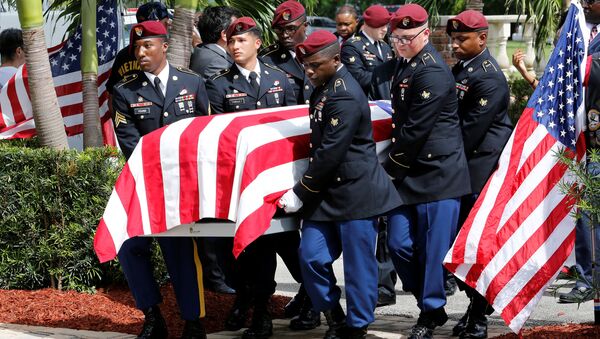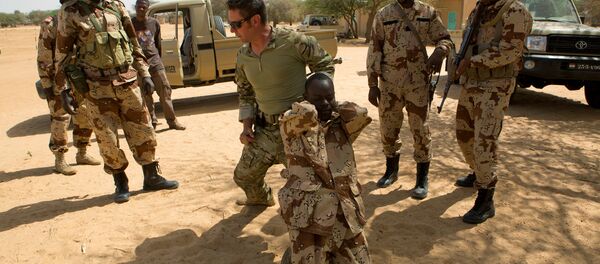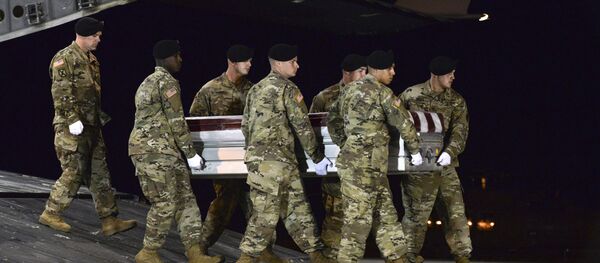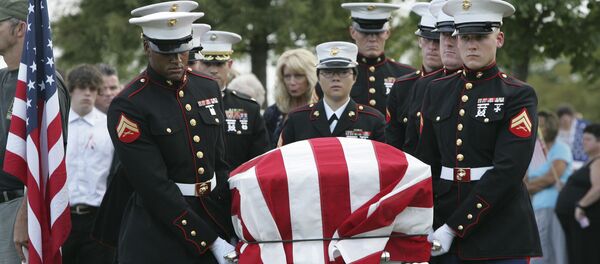Donald Bolduc told Stars and Stripes that in his 26 months as a commander at Special Operations Command Africa (SOCAFRICA), he was shot at, exposed to roadside bombs and caught up in firefights between local forces. "We've had guys in firefights there before as a result of our partners getting in firefights. That happens," Bolduc said.
One incident earlier this year, not far from the site of the now-infamous ambush, saw a US soldier killed when his vehicle flipped over. Bolduc added that there were also many incidents of minor injuries suffered by US soldiers during his tenure.
"It is dangerous. Our guys are operating in areas very similar in environment to Afghanistan, Iraq and Syria, but not with the same kinds of authorities and resources," Bolduc said. "We've had several, a number of, combat casualties there under my command."
An estimated 800 US troops are stationed in Niger alone, running training, support and drone missions to supplement Niamey's fight against radical groups such as the local Daesh offshoot, the Islamic State in the Sahel, or the local al-Qaeda branch, al-Qaeda in the Islamic Maghreb (AQIM).
But before news of the recent ambush broke, most Americans had no idea that there were any operations at all in Niger, or West Africa in general. Even some Congressmen said that they weren't aware of a US presence in the region until four American soldiers were killed in the ambush.
Reconnaissance missions, like the one that was underway when the ambush occurred, are commonplace for US soldiers. As Niger is relatively remote from major US operations in countries like Afghanistan and Somalia, they often work with inadequate intelligence and surveillance, according to Bolduc.
Much remains unknown about the incident, which is being investigated by the Pentagon and the FBI. Authorities are looking into whether or not the US deployment was given the proper levels of equipment and intelligence and if the mission was following the rules of engagement or not. They are also trying to determine why it took nearly 48 hours to discover the body of Sgt. La David Johnson, one of the US soldiers killed.
The US troops had been deployed to aid some 30 Nigerien warfighters in their search for an AQIM militant thought to be operating in the region. At some point during the mission, the objective shifted to gathering intelligence a Daesh leader instead — as of now, the reason for this switch is not known.
However, the rules of engagement for troops in Niger prohibit them from taking part in missions where enemy contact is deemed likely. While this obviously isn't an exact science, says Bolduc, a mission to kill or capture an enemy target would definitely violate this rule of engagement.
"They don't have the authorities in place to do that on the fly," he said. The captain of the expedition would have the authority, however, to expand the mission's information-gathering scope. "If he is following breadcrumbs of the mission they were out there to do, to gain information, and it wasn't something where he believed contact was likely, then we have to trust them to figure out what that point is."
Bolduc isn't particularly surprised that an incident like this occurred. "Not only did our partners see this [increased violence] coming, we knew it was coming, AFRICOM [US Africa Command] saw it coming and SOCAFRICA saw it coming," he said. "We knew exactly what was going on and the enemy was more active in this area and more effective in this area."
"I am sorry that all the sudden that everybody just turns on to the fact that this is a volatile, uncertain, complex area. I am sorry [Congress] just woke up to this in Washington, DC."





